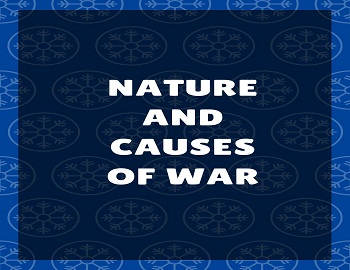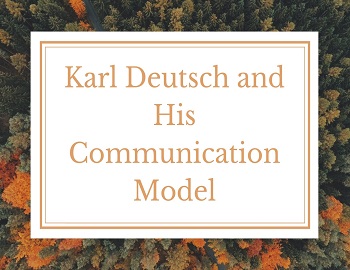Table of Contents
Nature and Causes of War:
War means a different thing to different people. To moralists, it is the greatest evil. For statesmen, it may be good because it maintains the independence and freedom of a nation. Soldiers find it heroic. To a powerful nation, it may appear to be the means to enslave other nations or reduce them to the status of puppets. For a weak nation, it means some terrible bloodshed with the possibility of annihilation should the fighting last too long. But in the modern era with the development of atomic weapons of mass destruction, war has become suicidal both for the victors and the vanquished. Sir Winston Churchill has well observed, I think there is greater realization everywhere now about the folly and complete uselessness of war, because it destroys both parties, and the time when a stronger party could defeat another party and benefit by it has passed or is passing”.
Definition of War:
The term war has been defined by various writers in different ways. According to the New English Dictionary, it is a “hostile contention by means of armed forces, carried on between nations, states or rulers, or between parties in the same nation or state, the employment of armed forces against a foreign power or against an opposing party in the state”.
According to Lawrence war may be defined as “a contest carried on by public force between states, or between states and communities having with regard to the contest the rights of states, the parties to it having the intention of ending peaceful relations, and substituting for them those of hostility with all the legal incidents thereof”.
According to Hoffman Nickerson, “War is the use of organized force between two human groups pursuing contradictory policies, each group seeking to impose its policy upon the other”.
Quincy Wright defines war in a broader as well as in a narrower sense. In a broader sense, he defines war as, “a violent contact of distinct but similar entities”. In a narrower sense, he means by war “the legal condition which equally permits two to more hostile groups to carry on a conflict by armed forces”.
According to Oppenheim, “War is a contention between two or more states through their armed forces for the purpose of overpowering each other and imposing such conditions of peace as the victor pleases”. As such, we define war as a contest of two or more nations by means of armed forces for the main purpose of conquering the other nations and dictating their own terms.
Causes of War:
The causes of war are numerous and varied. Exhaustive analysis of the causes of war has been made by various scholars and conferences from time to time. In fact, there is no end to listing the causes of war. The Conference on the Cause and Cure of War declared 250 causes of war under four headings; political, social, economic and psychological.
Wickham Steed found that fear of insecurity was the main cause of war. He maintained, “the feeling of insecurity and the fears it endangers, are undoubtedly the strongest potential causes of war in the world”. Prof. Charles Hodges pointed out twenty-one causes of war under four heads; social, strategic, political and economic.
However, for our purpose, we shall divide the causes of war as follows-
- Psychological Causes.
- Cultural and Ideological Causes.
- Economic Causes.
Psychological Causes:
It is sometimes said that “you can’t change human nature” and that “human nature makes war inevitable”. Many psychologists hold the view that man has a fighting instinct. Sigmund Freud is convinced that man has an innate drive towards evil, aggressiveness, destructiveness, and cruelty. According to him, “Men are not gentle, friendly creatures wishing for love who simply defend themselves if they are attacked…A powerful measure of desire for aggression has to be reckoned as part of their instinctual endowment”. As such many psychologists hold the view that as man has got the fighting instinct so war is inevitable. The following passage indicates their point of view:
“Man is born a wild animal, and civilized culture can only partially tame him. His instinctive urge to dominate others is coupled with a willingness to yield obedience to the strong when circumstances require it; not merely submission but also allegiance and support; and when those divergent trends reach their peak, a man may become the most cruel of tyrants or he may become the most long-suffering of beasts of burden…….The strife that develops the strong leaders engenders in the others the willingness to be led; it is perceived by them that fighting a common enemy is better than fighting each other”.
After briefly surveying events in the period between the two world wars, Darbin and Bowlby conclude, “No group of animals could be more aggressive than the adult members of the human race”.
Cultural and Ideological Causes:
Other causes of war are cultural and ideological. “Certainly a divergence of views and values among the members of a society constitutes an actual or potential source of conflict and increases the difficulty of settling disputes peacefully”. It is believed by some scholars that cultural differences among nations are supposed to be far greater than they actually are and this fact is more responsible for conflict than are the differences themselves.
There are ideological causes of war. The so-called Hindu-Muslim, Muslim-Christian, Protestant-Catholic wars were certainly motivated by ideological causes or we may say by opposing value systems. It is assumed that the basic cause of the cold war which followed World War II was the existence of two incompatible ideologies (communion and democracy) in one world.
Economic Causes:
Sometimes economic factors contribute to the development of friction or the outbreak of war among states. The pursuit of economic objectives both abroad and at home contributes to war. People who trade or travel or invest abroad draw their governments after them into colonial ventures, this occurs more often in relations between strong and weak powers than in relations between strong powers themselves. “Governments seeking to promote domestic prosperity sometimes take measures which create international friction and increase the probability of war; they enact trade controls which undermine prosperity abroad, they discriminate against aliens in domestic economic life, and they may use armament programmes to relieve or avert unemployment.
J. K. Hobson, an Englishman, and Lenin are the chief exponents of the view that economic reasons are the crucial factors in the outbreak of war. Hobson’s view rests on the idea of over-production, under-consumption, the idea that a capitalist country produces more than it consumes. Their results, Hobson argues, are a surplus of goods and a surplus of capital, and the presence of the surplus, in turn, leads to a search for foreign markets in which the surplus goods can be sold and surplus capital invested. Out of such a search, Hobson holds, wars arise.
According to Lenin, capitalism in its monopolist form is expansionist because capitalism comes to control surplus capital. Thus they invest the surplus capital in less advanced countries where they can get more profits. Having invested, they want their investment to be more secure. “The necessity of exporting capital gives an impetus to the conquest of colonies, for in colonial markets it is easier to eliminate competition, to make sure of orders…..by monopolist methods”. Thus Lenin holds that wars arise out of the imperialist struggle. The inference of Lenin’s argument was that wars would be inevitable as long as capitalism endured.
In short we agree with Prof. Wright that…there is no single cause for war. Peace is an equilibrium among many forces. Change in any particular force, trend, movement, or policy may at one time make for war, but under other conditions a similar change makes for peace. A state may at one time promote peace by armament, at another time by disarmament; at one time insistence on its rights, at another time by a spirit of conciliation”.









Comments (No)